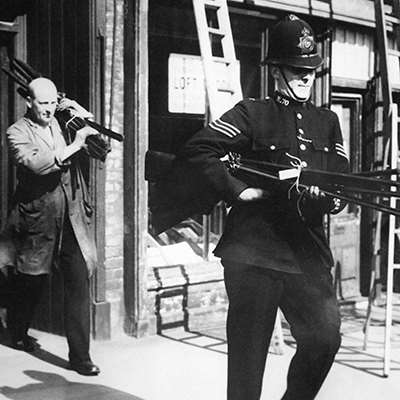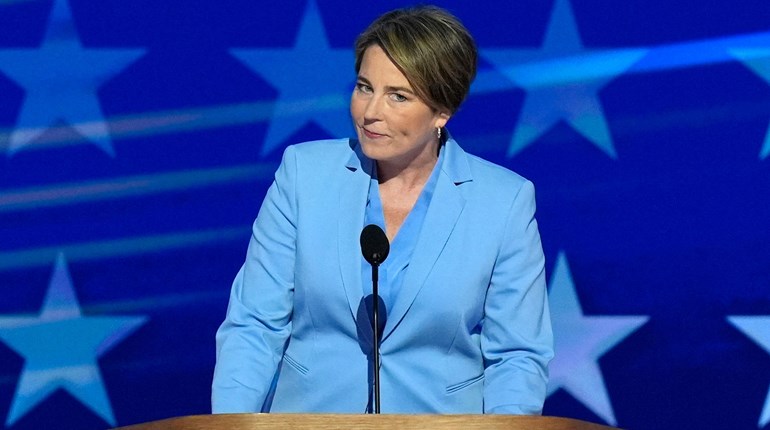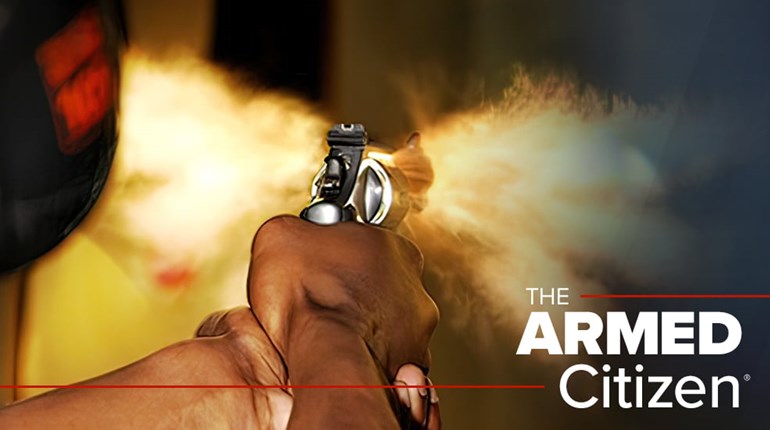
Gun-rights activists in the United Kingdom (right) protest in 1997 as the country’s legislators moved to effectively ban civilian ownership of all handguns.
It has long been observed that the price of liberty is “eternal vigilance.” Presumably, this holds twice as true when one’s country stands alone among the nations of the world.
America is, by explicit design, an exceptional place in which things are done differently. To its detractors, this difference is incalculably annoying: “This is the only country in the world,” Americans who envy others will gripe, “in which....” To its admirers, by contrast, America’s individuality is a source of both hope and pride. The United States remains the shining city upon the hill, the last great hope, the focal point for freedom around the globe.
And yet, America’s cherished idiosyncrasy yields a conspicuous risk: That, after a while, the country will forget why it was founded in the first place and fall carelessly into line with the others.
Champions of the United States like to ask what would happen if it should change beyond all recognition. And they are right to do so. What, indeed, would be the prospect for freedom if the U.S. Constitution should be overthrown or abandoned? What would happen to the individual if his or her basic liberties—which are protected here to a unique degree—should come to be watered down to the vanishing point?
As an immigrant who moved to the United States as an adult, I am often asked such questions. More specifically, I am often asked whether I consider it likely that my new country, the United States of America, will follow my old country, Great Britain, in abandoning some of the foundational liberties that, for a period at least, marked the two out. “How,” nervous natives inquire, “can we avoid the draconian gun-control regime under which the British have now lived, in one form or another, for decades?”
America is Fundamentally Different
There are many, many ways in which the United States is substantially different from Great Britain. It is true that the right of the people to keep and bear arms originated in its present legal form in Britain, most famously in the 1689 Bill of Rights. And yet it is also the case that this right did not permeate either the legal superstructure or the commonplace political culture in Britain in anything like the way it did in the United States.
The legal differences are substantial. Unlike the U.S. Constitution, which was intended to serve as a permanent, super-majoritarian check on the ambitions of the governing classes, the 1689 Bill of Rights represented nothing more profound than a temporary, contingent set of promises that could be—and would be—washed away by the British parliament.
…in Britain…the lack of a written Constitution and an ever-changing set of national principles ensured that the right to keep and bear arms was neither set in stone in the law nor tattooed onto the hearts of the people.
Explaining the benefit of an American bill of rights in 1788, James Madison proposed that the liberties that it would contain would not merely be enforceable as a matter of contract, but as a matter of culture, too. The contents of a bill of rights, Madison explained, would “acquire by degrees the character of fundamental maxims of free Government, and as they become incorporated with the national sentiment, counteract the impulses of interest and passion.”
This, without doubt, is exactly what has happened in the United States, where the Second Amendment is considered part of the national birthright. No such acquisition was made in Britain, however, where the lack of a written constitution and an ever-changing set of national principles ensured that the right to keep and bear arms was neither set in stone in the law nor tattooed onto the hearts of the people.
History, too, has made the gun a far more potent symbol of independence and liberty in America than in Britain. Unlike the British, the people of the United States achieved their independence by a revolution that was fought and won by the common man and his everyday weaponry. Unlike the British, the people of the United States were called upon from the beginning to settle, inhabit and then expand a continent so enormous and so hostile as to render the ownership of arms effectively mandatory.
Unlike the British, the people of the United States developed and then cherished a distinct frontier culture in which to be without a lever-action rifle or a revolver was to be catastrophically exposed. Unlike in Britain, many parts of the United States played host to a malignant racial tyranny in which, as Ida B. Wells has noted, the only chance of survival came from the barrel of “a Winchester rifle,” which “should have a place of honor in every black home” and “should be used for that protection which the law refuses to give.”
Those who are familiar with George Orwell’s famous insistence that the “rifle on the wall of the labourer’s cottage or working class flat is the symbol of democracy” would be forgiven for assuming that, despite these historical differences, there existed at some point in British history a comparable enthusiasm for the right to keep and bear arms. But Orwell’s line, while absolutely correct substantively, must be understood within the context of what has always been a far more deferential and class-ridden society than the United States. Orwell, remember, was a self-professed democratic socialist who fought on the Republican side in the Spanish Civil War in 1937 and came away convinced that the radical advances in military technology would be used to crush the individual. As the world was about to learn, his fears were well-founded. But firearms were not necessarily common and neither was fear of a powerful national military in a country that owed its historical preeminence to its unmatched naval supremacy. Orwell’s leveling instincts notwithstanding, it remains the case that, for the average Briton, the archetypal armed hero is the knight, whereas, for the average American, it is the Lexington Minuteman and the cowboy.
Which is to say that, while the British have indeed been heavily armed at various points in their history, they have never developed quite the same democratic attachment to the ownership of guns as did their American cousins. In his famous treatise on Blackstone’s Commentaries,
St. George Tucker observed that, while the portion of the English Bill of Rights that dealt with the right to keep and bear arms “seems at first view” to resemble the Second Amendment, in practice it was far more restrictive, being limited to protestants and subjected to the whims of the aristocracy, which was able to head off any fear of insurrection by passing draconian laws that banned guns under the auspices of regulating poaching.
Which is why, when the British government began to crack down on private ownership in 1903, the public did not demonstrate the sort of concerted, aware and forward-thinking resistance that Americans have repeatedly shown.
Britons Gave Up Their Freedom Piece By Piece
It is unfashionable these days to offer a “slippery slope” argument against a particular policy, or to draw sweeping conclusions from an ostensibly limited set of aims. But I wonder how else one might reasonably characterize what happened to British gun rights in the twentieth century, other than as a slow and deliberate march toward abolition? To my eyes, at least, the pattern is clear. First, the guarantees contained within the 1689 Bill of Rights were abolished in favor of a strict licensing system. Next, that licensing system was used to shape who might own firearms and why. And then, having established that the whole area was up for grabs, the state began to ban various types of guns until, eventually, almost none were available for the public.
From start to finish, it took 94 years. Before 1903, British citizens had been subject to no laws governing the purchase of firearms and no laws governing the use or ownership of firearms on their own property. In 1903, that all changed with the introduction of the first licensing system in British history: a “shall-issue” certificate, available from the Post Office, that was made a mandatory part of the commercial purchase of handguns.

That arrangement, which was seen as a moderate incursion at the time, lasted just 17 years until, in an explicit attempt to prevent the working classes from taking advantage of the influx of firearms that had come along with the end of the First World War, the “shall-issue” rule was nixed in favor of a new “firearms certificate” that applied to all guns except for shotguns, that limited the types of weapons and ammunition that each citizen was permitted to own, and, crucially, that could be denied to applicants by local police “for any reason.”
In 1937, the government took the final step in abolishing firearms ownership as a right, removing “self-defense” from the list of acceptable reasons for wanting a certificate and determining that “firearms cannot be regarded as a suitable means of protection.” In 1968, a “good reason” test was added.
The rest was inevitable. In 1988, the British government outlawed semi-automatic rifles, pump-action shotguns and shotguns with magazines; they developed a shotgun registry; and they extended police-reviewed, safe-storage requirements so that they applied to shotguns as well as to other firearms. In 1997, handguns of all types were banned completely and without exception. And that, as they say, was that.
Can it happen here? Sure, it can. The good news is that the United States has none of the aforementioned gun-control provisions at the federal level, and only a few of them in a handful of states. So if we are on that slippery slope, we are still at the far end of it eyeing it skeptically. The bad news is that there are many powerful people in the United States who would like desperately to see most—if not all—of these laws passed here, and that, as history shows, there is nothing magical about America that renders it immune to precisely the sort of “salami” tactics (slice by slice) that have led to the decline in freedom elsewhere. As is the case with free speech, freedom of conscience, freedom of religion and so forth, one of the most powerful arguments wielded by the advocates of more government is “well, we already require a pistol license!”; “we’ve already imposed conditions”; “we’ve already banned rifles....”
The Second Amendment is, in all of human history, one of the only liberty-preserving provisions that has been partially lost and then mostly restored in the United States. Its renaissance serves as an inspiring example of what can be done politically when real grassroots movements push back. Nevertheless, we must consider the chances of a second comeback to be extremely slim indeed. Happily, not only are Americans the heirs to the greatest charter of freedom the world has ever seen, they have also inherited a wealth of knowledge about the playbooks that have been used elsewhere. How does a people fall into abject ruin? We know, thanks to the evidence from Russia, China and Germany. How is free speech slowly chipped away, even in a stable democracy? We know, thanks to the evidence from Canada and France. How does a country go from enjoying a de facto gun culture to passing an all-out ban? We know, thanks to the evidence from Britain.
Want to keep your firearms? Then fight for your freedom every step of the way.


































